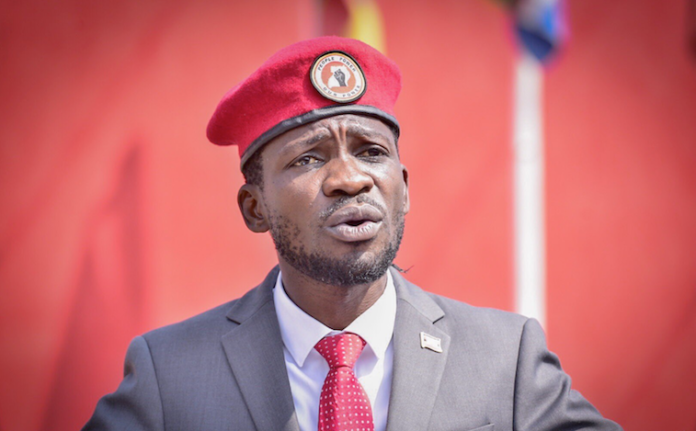The political climate in Uganda remains tense as the main opposition leader, Robert Kyagulanyi alias Bobi Wine, was arrested upon his return to the country. The National Unity Party had planned to hold rallies, but their efforts were thwarted by the arrest of their leader at Entebbe International Airport.
This latest incident has been condemned by the party, describing it as cowardly and a clear sign of the government’s increasing intolerance towards the opposition.
President Yoweri Museveni, who has held power since 1986, has faced mounting criticism for his authoritarian rule and suppression of dissent. Bobi Wine, a popular figure among the Ugandan youth, has been a thorn in Museveni’s side since his emergence as a political force.
[ Naira Marley Taken Into Police Custody Over MohBad’s Death ]
Despite facing numerous arrests and charges, including treason, Bobi Wine has remained resilient in his fight for democracy and equal rights. Human rights groups have long accused the Ugandan authorities of using trumped-up charges to stifle opposition voices and maintain the status quo.
This recent arrest of Bobi Wine is not an isolated incident but part of a broader pattern of crackdown on democracy in Uganda. The government’s increasing intolerance towards the opposition and its heavy-handed tactics have raised concerns among the international community.
A History of Oppression
President Museveni’s grip on power has been unyielding for over three decades, and his regime has been marred by allegations of human rights abuses and electoral fraud. Opposition leaders, activists, and journalists critical of the government have often found themselves facing arbitrary arrests, harassment, and even violence.
Bobi Wine, a former musician turned politician, has emerged as a symbol of hope for many Ugandans who are disillusioned with Museveni’s regime. His popularity stems from his ability to connect with the youth and address their grievances, advocating for change and a more inclusive society.
However, his rise to prominence has come at a great personal cost. Bobi Wine has been arrested multiple times, often on trumped-up charges, and has faced physical assault and torture while in custody. Despite these hardships, he remains steadfast in his commitment to fighting for a better Uganda.
A Government on the Defensive
The arrest of Bobi Wine is a clear indication that President Museveni’s government is feeling threatened by the growing popularity of the opposition. As the country gears up for the upcoming elections, tensions are running high, and the government is resorting to increasingly desperate measures to maintain its grip on power.
[ DR Congo Colonel Who Ordered Protesters Killings Sentenced To Death ]
The international community has been closely monitoring the situation in Uganda, and several countries and human rights organizations have voiced their concerns over the deteriorating human rights situation. The arrest of Bobi Wine further highlights the urgent need for international pressure to hold the Ugandan government accountable for its actions.
A Call for International Support
Uganda stands at a crossroads, and the upcoming elections will be crucial in determining the future of the country. It is imperative that the international community stands in solidarity with the Ugandan people and supports their quest for democracy and freedom.
Pressure must be exerted on the Ugandan government to respect human rights, release political prisoners, and create an environment conducive to free and fair elections.
The arrest of Bobi Wine should serve as a wake-up call to the world, reminding us of the importance of defending democracy and holding oppressive regimes accountable.
Conclusion
The arrest of Ugandan opposition leader Bobi Wine is not only an attack on one individual but a direct assault on democracy and the fundamental rights of the Ugandan people. It is imperative that we raise our voices and demand justice for Bobi Wine and all those who have been unjustly targeted by the Ugandan government.
The international community must come together and exert pressure on President Museveni’s regime to end its crackdown on dissent and create a space for genuine political participation. Only through collective action can we hope to bring about meaningful change and ensure a brighter future for Uganda.


